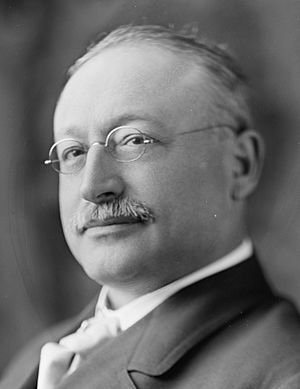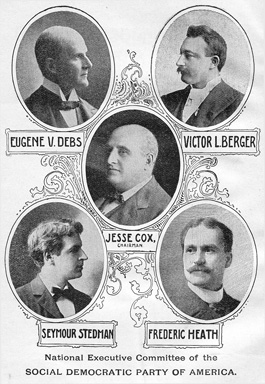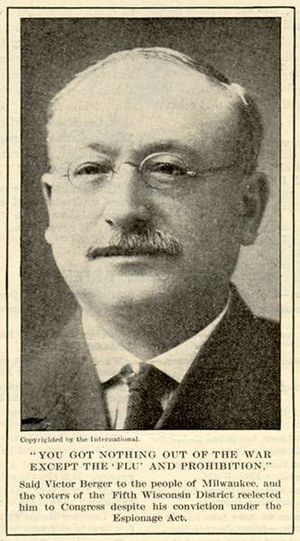Victor L. Berger facts for kids
Quick facts for kids
Victor Berger
|
|
|---|---|
 |
|
| Member of the U.S. House of Representatives from Wisconsin's 5th district |
|
| In office March 4, 1923 – March 3, 1929 |
|
| Preceded by | William H. Stafford |
| Succeeded by | William H. Stafford |
| In office March 4, 1919 – November 10, 1919 Unseated |
|
| Preceded by | William H. Stafford |
| Succeeded by | William H. Stafford (1921) |
| In office March 4, 1911 – March 3, 1913 |
|
| Preceded by | William H. Stafford |
| Succeeded by | William H. Stafford |
| Personal details | |
| Born |
Victor Luitpold Berger
February 28, 1860 Nieder-Rehbach, Austria (now Romania) |
| Died | August 7, 1929 (aged 69) Milwaukee, Wisconsin, U.S. |
| Political party | Socialist |
Victor Luitpold Berger (February 28, 1860 – August 7, 1929) was an Austrian-American politician and journalist. He was a key figure in the early socialist movement in the United States. Berger helped create the Social Democratic Party of America and later the Socialist Party of America.
Born in the Austrian Empire (now part of Romania), he moved to the United States when he was young. In Wisconsin, he became a very important socialist journalist. He also helped start the "Sewer Socialist" movement. In 1910, he made history as the first Socialist elected to the U.S. House of Representatives. He represented a district in Milwaukee, Wisconsin.
In 1919, Berger faced legal issues for sharing his anti-war ideas. Because of this, he was not allowed to take his seat in Congress, even though he had been elected twice. However, the Supreme Court later overturned his conviction in 1921. After this, Berger was elected to Congress three more times in the 1920s.
Contents
Who Was Victor Berger?
Early Life and Move to America
Victor Berger was born on February 28, 1860, into a Jewish family. His birthplace was Nieder-Rehbach, in the Austrian Empire. This area is now part of Romania. He went to schools in Leutschau (now in Slovakia) and universities in Budapest and Vienna.
In 1878, he and his parents moved to the United States. They first settled near Bridgeport, Connecticut. Some believe he left Austria-Hungary to avoid joining the military.
Life in Milwaukee
In 1881, Berger moved to Milwaukee, Wisconsin. This city had many German Americans and a strong labor movement. He joined the Socialist Labor Party. He also became an editor for two newspapers, Vorwärts (meaning 'Forward') and Die Wahrheit (meaning 'The Truth').
Berger taught German in public schools. In 1897, he married Meta Schlichting, who was also a socialist organizer. Meta Berger later served on the University of Wisconsin Board of Regents for many years. They had two daughters, Doris and Elsa.
Becoming a Socialist Leader
Influencing Eugene V. Debs
Victor Berger played a big role in convincing Eugene V. Debs to become a socialist. Debs was a famous trade union leader. After being jailed for a strike in 1894, Debs began reading many books.
Berger visited Debs in prison and shared his socialist ideas. Debs later said that Berger's message was the first to truly inspire him. Berger even gave Debs a copy of Capital by Karl Marx.
Building the Socialist Party
Berger was a founding member of the Social Democracy of America in 1897. He then helped create the Social Democratic Party of America (SDP) in 1898. He was also a key founder of the Socialist Party of America in 1901.
He was known for his "revisionist" Marxist ideas. This meant he believed in using elections and gradual reforms to build a socialist society. He thought that working within the political system was the best way to make changes.
Berger was not a great public speaker. He had a strong German accent and a quiet voice. Instead, he was excellent at writing newspaper articles. He published and edited several papers throughout his life. These included the German language Vorwärts (1892–1911), the Social-Democratic Herald (1901–1913), and the Milwaukee Leader (1911–1929).
Serving in Congress
First Term and Key Ideas
Berger ran for Congress in 1904 but lost. He won the Wisconsin's 5th congressional district seat in 1910. This made him the first Socialist to serve in the United States Congress.
In Congress, he focused on issues for the District of Columbia. He also proposed more radical ideas. These included removing the President's veto power and getting rid of the Senate. He also suggested that major industries should be controlled by the public.
Berger became well-known for his bill to create an old-age pension. This was the first bill of its kind in Congress. After the Titanic disaster, he proposed that the government should own all radio-wireless systems. He argued that the chaos during the Titanic event showed the need for government control.
He did not win re-election in 1912, 1914, or 1916. However, he remained active in Wisconsin and Socialist Party politics.
Dealing with Party Conflicts
Berger was very involved in a big debate within the Socialist Party before World War I. This was about whether the party should allow members who supported "sabotage" or violence. At the 1912 National Convention, Berger strongly argued against these ideas.
He believed that such actions were like anarchism and harmful to the party. He pushed for a rule to remove members who supported violence. His side won, and many radical members left the party.
World War I and Its Impact
Opposition to War
Berger's views on World War I were complex. He supported his party's stance against the war. When the United States joined the war and passed the Espionage Act of 1917, Berger's continued opposition made him a target.
In February 1918, he and four other Socialists were accused of breaking the Espionage Act. On February 20, 1919, Berger was found guilty. He was sentenced to prison.
Elections and Disqualification
Even though he was facing legal issues, the people of Milwaukee elected Berger to the House of Representatives in 1918. When he arrived in Washington, Congress decided he should not be seated. They declared his seat empty on November 10, 1919.
Wisconsin held another election, and on December 19, 1919, they elected Berger again. But on January 10, 1920, the House again refused to seat him. The seat remained empty until 1921.
Conviction Overturned
Berger's conviction was appealed. On January 31, 1921, the U.S. Supreme Court overturned it. They found that the judge in his trial had not handled the case properly.
Later Years in Congress
Berger defeated William H. Stafford in 1922 and was reelected in 1924 and 1926. During these terms, he worked on several important issues. These included changes to the Constitution, a proposed old-age pension, unemployment insurance, and public housing.
He also supported recognizing the Soviet Union as a country. He wanted to change parts of the Treaty of Versailles, which ended World War I. After losing to Stafford in 1928, he went back to Milwaukee. He continued his work as a newspaper editor.
Death and Legacy
On July 16, 1929, Berger was hit by a streetcar in Milwaukee. He was crossing the street outside his newspaper office. He died from his injuries on August 7, 1929. His body was placed at City Hall before burial, and 75,000 people came to pay their respects.
Historians say that Berger built the most successful socialist political group in an American city. He focused on national politics and became a strong voice for reforms within the Socialist Party. He believed in democratic values and peaceful changes to society.
His writings are kept at the Wisconsin Historical Society. The full collection of his newspaper, the Milwaukee Leader, is also available.
See also
 In Spanish: Victor L. Berger para niños
In Spanish: Victor L. Berger para niños
 | Delilah Pierce |
 | Gordon Parks |
 | Augusta Savage |
 | Charles Ethan Porter |



